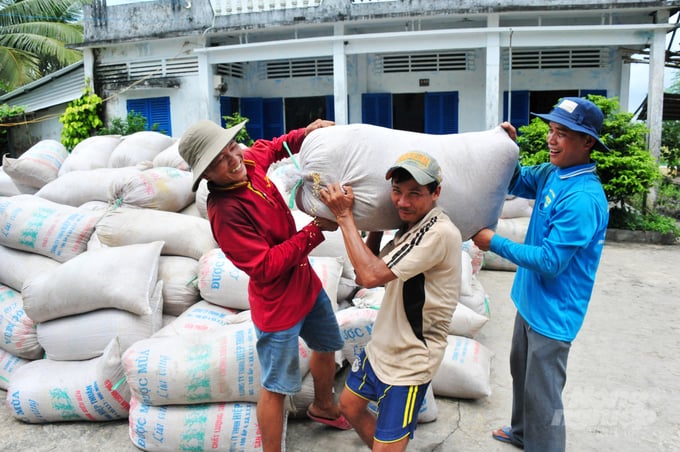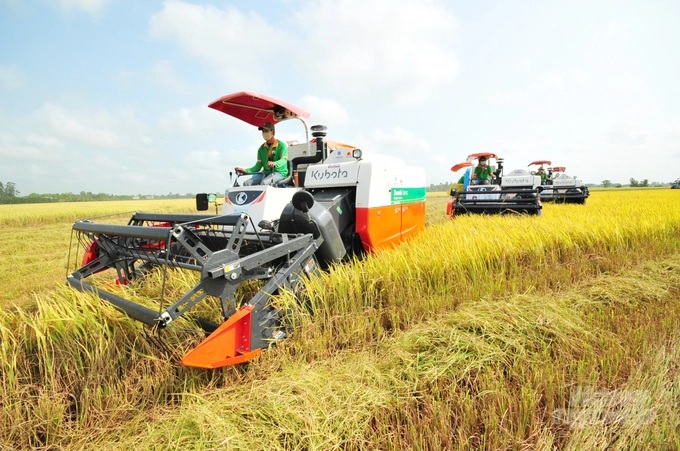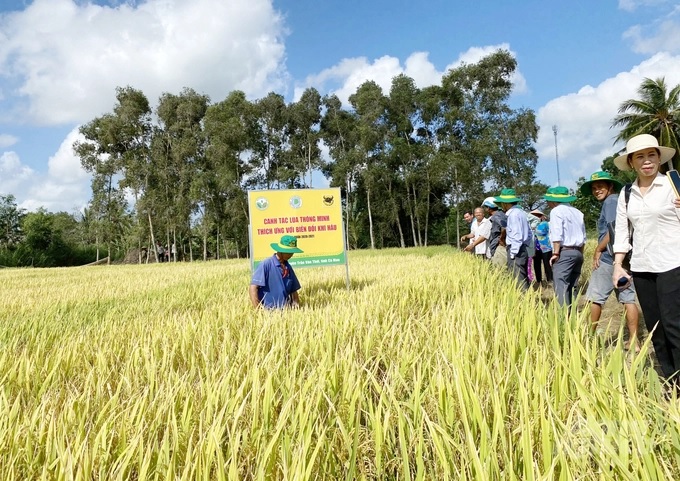May 16, 2025 | 17:02 GMT +7
May 16, 2025 | 17:02 GMT +7
Hotline: 0913.378.918
May 16, 2025 | 17:02 GMT +7
Hotline: 0913.378.918

The 1 million hectares of high-quality rice project is expected to solve many difficulties for rice production in the Mekong Delta. Photo: Le Hoang Vu.
On March 30, in Can Tho City, the Department of Crop Production (MARD), in collaboration with the International Rice Research Institute (IRRI), organized a workshop on "Agriculture adapting to climate change for Asia plain region" with two initiative programs from CGIAR (Consultant Group for International Agricultural Research), including the excellent agricultural initiative to adapt to climate change (Excellence in Agronomy) and the initiative to ensure food security, protect the Asian delta (Asian Mega-Delta).
The workshop aims to provide solutions for agriculture to adapt to climate change and reduce emissions; focusing on precise sowing solutions, developing and applying climate risk maps and adaptation plans; monitoring tools for crop management reports; development of circular economy solutions from straw; climate change learning coalition tool; agro-climate services and propose priority activities for cooperation between the two programs Excellence in Agronomy and Asian Mega-Delta.

The Asian region contributes 90% of rice serving the world, in which the Mekong Delta rice fields play a very important role. Photo: Le Hoang Vu.
Dr. Virender Kumar, Research Deputy Director of the Sustainable Impacts Division of IRRI, said, “Rice production, with an output of more than 500 million tons/year, is the primary food source for more than 3.5 billion people worldwide, of which 90% are from Asia. But rice production worldwide currently has to face many challenges, such as climate change, drought, salinity intrusion, irregular rains and floods, and labor shortages. In particular, wet rice production is a significant problem as it causes an increase in greenhouse gas emissions."
Currently, the Ministry of Agriculture and Rural Development of Vietnam is implementing a project of 1 million ha specializing in high-quality rice cultivation associated with green growth in the Mekong Delta (referred to as the 1 million ha of high-quality rice Project). In particular, the Mekong Delta rice industry will develop a modern, high-quality rice farming area associated with green growth. The key tasks include synchronous mechanization of rice production and rapid application of high technology, aiming toward accurate and innovative rice farming practices.

Mr. Le Thanh Tung, Deputy Director of the Department of Crop Production (MARD) spoke at the workshop. Photo: Le Hoang Vu.
According to Mr. Le Thanh Tung, Deputy Director of the Department of Crop Production (MARD), in the process of implementing the 1 million hectares of high-quality rice Project, the main contents will focus on building a model to demonstrate the advanced rice production process, including the application of high-quality technology and synchronous mechanization, meeting the goal of high-quality rice associated with green growth.
The minimum scale of each model is 100 ha. Depending on the conditions of localities and ecological regions, each province-level locality will coordinate with associated enterprises to build 1-2 models in two consecutive crops, then summarize and develop a replication plan.
Binh Dien Fertilizer Joint Stock Company is one of many domestic enterprises participating in the 1 million ha of high-quality rice project. The company has built hundreds of innovative rice farming models to adapt to climate change in the Mekong Delta.
Mr. Ho The Huy, Region Head of the Mekong Delta, Binh Dien Fertilizer JSC, said that the company had coordinated with the National Agricultural Extension Center and 13 provinces in the Mekong Delta to implement a smart rice farming program that adapts to climate change from 2016 to 2022 with nearly 500 models in winter-spring and summer-autumn crops, bringing practical impacts to farmers' lives.
The process of integrated rice farming adaptive to climate change in the Mekong Delta is the product of the program "Smart rice farming to adapt to climate change in the Mekong Delta" which inherits the results of farming processes "3 decreases 3 increases" and "1 must 5 decreases" along with a package of advanced farming techniques to help improve the efficiency of rice production in the Mekong Delta.

Binh Dien Fertilizer Joint Stock Company built hundreds of smart rice farming models to adapt to climate change for farmers in the Mekong Delta Photo: Le Hoang Vu.
Mr. Tran Thai Nghiem, Deputy Director of the Department of Agriculture and Rural Development of Can Tho City, said, "Rice production in the Mekong Delta is experiencing fairly good results. In Can Tho City alone, the 3 crops/year structure can give a yield of over 18 tons/ha/year... Through the workshop, I hope that scientists and IRRI would suggest essential policies to help the agricultural sector at all levels have appropriate solutions and policies to effectively implement the 1 million ha of high-quality rice Project in the near future."
Translated by Ha Phuc

(VAN) Cold-barn systems efficiently manage environmental and temperature conditions, which aids in the prevention of respiratory diseases in pigs and protects them from the vectors that transmit African swine fevers.

(VAN) To tackle challenges, the project 'Addressing key technical bottlenecks in the grouper supply chain in Vietnam' has been underway since 2024.

(VAN) The project 'Disease-Resilient and Sustainable Cassava Production Systems in the Mekong Region', funded by the Australian Center for International Agricultural Research (ACIAR), is being implemented from 2024 to 2028.

(VAN) Data from 10,000 farming households will help professionalize production organization and support the implementation of the One Million Hectares Program for High-Quality, Low-Emission Rice Cultivation.

(VAN) FAO Director-General QU Dongyu marks International Day of Plant Health at NENA conference.

(VAN) Deputy Minister of Agriculture and Environment Hoang Trung affirmed that floriculture and ornamental plants are a growing industry that receives significant global attention.

(VAN) The three staple crops dominating modern diets – corn, rice and wheat – are familiar to Americans. However, fourth place is held by a dark horse: cassava.